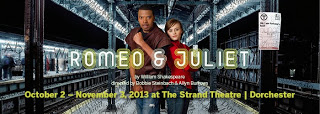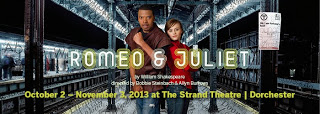Thanks to Duane for letting me nerd out a bit more on the Shakespeare side than I would for my usual film reviews on Making the Movie.
Category: Romeo and Juliet
Romeo and Juliet remains popular due to its tragic love story, relatable characters, and universal themes of love, fate, and the clash between youth and age. Its enduring popularity is also attributed to its poetic language and captivating storytelling, as well as its numerous adaptations and cultural references. The play has been adapted countless times in film, theatre, and literature and continues to be studied and performed worldwide, making it one of Shakespeare’s most beloved works.
Browse the text of Romeo and Juliet entire play here.
Actors’ Shakespeare Project Launches 10th Season with Romeo and Juliet
Let’s Talk Cymbeline
[So, how was everybody’s summer? Sorry I haven’t been posting as much as I used to, many projects have pulled me in many directions that are not Shakespearean. I shall try to return to a better pace now that the kids are back in school.]
- High level plot overview. Everybody needs some plot.
- Famous quotes or moments the play is known for? I learned the importance of this when I saw As You Like It in the park. The crowd was all noisy and buzzing, like crowds are, until Jaques boomed, “All the world’s a stage…” and it was like you could hear a pin drop. As if the entire crowd in unison said, “Oh hey, I recognize that!” and started listening.
- Important scenes / subject to interpretation that will make for interesting “Why did they do it that way?” discussion afterward. Every production of every Shakespeare play is different, and that’s why we love them. Once you’re an expert in any given play you can pick out every last detail – but when you’re seeing it for the first time you’re not going to have much to compare it against. So we pick some scenes to stick in our memory. For instance I once saw a King Lear who actually bargained with the storm in his big scene, if you can believe it. I’ll never forget him cowering from the thunder while he gave his big speech as if he was complimenting nature on how big and powerful she was.
Do You Recommend Shakespeare Movies?
Yesterday my boss told me that he’d watched the ending of Ralph Fiennes’ Coriolanus with his wife the previous night. Apparently it was on one of the movie channels, or they were channel surfing or something, but the general gist was that he only saw the ending.
He then asked me whether he should take the time to watch the whole thing.
It’s a trickier question than you might first think. I am careful in my Shakespeare recommendations. I do not blindly say “ABSOLUTELY YES ALL MUST SEE ALL PLAYS AT ALL OPPORTUNITIES.” On the contrary, I’m well aware that to the unitiated, sitting through a Shakespeare play can be a chore.
Here’s what I told him, first about Coriolanus and then about Shakespeare recommendations in general:
“Keep in mind that the ending is different from the source text, and this upset some people greatly. If you don’t know the text that may not matter, but keep in mind that your expectations are now set for the movie, not for what Shakespeare wrote. Having said that, I think the ending is the best part. I love the way Coriolanus stands up to Aufidius at the end and hurls his ‘Boy!’ back in his face in legendary fashion.
“Whether you should watch the whole thing? That’s different. See, I watch them to see different interpretations of my knowledge of the text. I mean, I don’t know the text inside and out, but I do know enough to compare one version to another and the focus in on why they are different. I have my scenes that I look for and pay close attention to. Without that? For the casual movie goer who has no knowledge of the text? Then I’m not really sure I recommend sitting through it. I think it will be difficult to follow.”
Is that sacrilege? Even now writing it I feel bad, like I should go seek out the boss and say “I changed my mind.”
Note a couple things. I’m not talking about live theatre. I think the experience of live Shakespeare is a must see and I always recommend going. But we’re talking about movies here, and I think that sitting on your couch with a remote control sitting through two hours of special effects and soundtrack and camera cuts is a different beast.
Second, I would not say the same about Romeo and Juliet or Hamlet. I think that both those places are so deeply ingrained in popular culture that even if you’ve never read them, you’ve got a significant head start on what’s going on. But Coriolanus? That’s a different story. If somebody hasn’t explained it to you up front (or, even better, while you’re watching it), I think it’s a harder sell.
Thoughts? Somebody with no knowledge of play X asks whether he should watch a movie of play X. What do you say?
Romeo and Juliet, by Dire Straits
(Spotted first by @FolgerLibrary!)
American Songwriter gives dddus the chance this morning to talk about one of the great moments in “Shakespeare put to music” — Dire Straits’ Romeo and Juliet. Acknowledging that “Knopfler just used those iconic names as a jumping-off point for a portrait of a modern romance,” the author of the piece goes on to examine (with ample Shakespeare references) just where the similarities lie.
What the piece does not do is ask the all important question that we ask ourselves whenever this song comes up. Who had the best version?
First we have Dire Straits’ original, from Making Movies.
Next up is the version I think I’m most familiar with (well, besides the original) — Indigo Girls. I don’t think they’ve got an official music video for the song, so the best I could find was this live clip.
Now here’s the version that everybody else but me seems more familiar with — The Killers. I’ve got a bunch of their stuff in my regular playlists, but this one just never seemed to find its way to the list.
For a bonus, here’s a couple I never knew existed. First, Edwin McCain (“I’ll Be”, “I Could Not Ask For More”, …)
And, finally, somebody named Dan Hardin? I don’t know anything about him, but I spotted people talking about his version on the YouTube comments so I thought I’d give him a shout out. Warning, the video’s awful. But the singing is good.
Which version is your favorite? Or do you have another version that you prefer, that I missed? Let us know!


